“CHILE EN EL CORAZON” : « I went to the Plaza de la Dignidad (ex Plaza Italia) where I saw for myself how the forces of order are not used to serve public order or guarantee the right to protest, but to inflict harm, pain and disability on those who exercise their right to the freedom of expression”, says Judge Baltazar Garzón, in this letter published 1.2.20.
Presentation:
On 10 October 1998, the Spanish magistrate Baltasar Garzón indicted General Augusto Pinochet for human rights violations perpetrated in Chile during the Pinochet’s dictatorship (1973-1990). Augusto Pinochet was arrested in London and detained for one and half year, before being released by the Blair-Straw government in March 2000.
Posadiststoday.com present this letter which shows how the revolutionary struggle of the peoples influences and wins top layers in the capitalist states. The same thing surely happens in the armies of the capitalist countries, but this fact is kept hidden. At the end of the document, the reader will find the song by Pablo Milanes (born in Cuba Feb 1943): “I will step on the streets again, of what was bloodied Santiago …. “
Posadiststoday.com – 18.2.2020
“Queridas chilenas y chilenos:
Here I write again, this time to address the people of Chile. My previous open letter published on 23 October 2019 was addressed to President Piñera but I got no reply, by the way.
In that letter, I was expressing my hurt and deep concern about what is happening in Chile, a country I am irrevocably attached to and for which I feel a special affection. It seemed to me then, and it still does now, that the Government’s response to the social upheaval has been absolutely disproportionate against a people that takes to the streets because it can no longer stand for so much inequality, injustice, abuse and corruption.
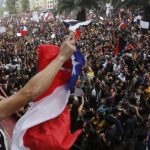
I also said in the letter, as I did in other forums, that the army is not an instrument of public order. It is a means of war, to repel or to destroy the enemy; and that when the army is sent in the streets, things only get worse. It was with stupor therefore that I saw Piñera making several attempts at military intervention. He does not seem to understand that the people are not the enemy, but the victim, and that the people must be protected instead of punished with exceptional measures.
It seems paradoxical that this explosion of social protest should happen in a country so keen to be seen in the world as a Latin American oasis, concerned with the environment, and fit to oversee the coordinated global response to the climate emergency at the COP 25 that Chile should have hosted. This did not happen because Piñera and his government did not want the leaders of the rest of the planet to see how he meets the social demands of his own countryfolk with repression and yet more repression, and with no shame at all.
You will surely know that after that letter, I travelled to Santiago de Chile to participate in the Latin American Forum of Human Rights held between 23-25 January 2020. There, I met with associations of victims, human rights and civil society organizations to get their impressions of what happened in Chile since October 18. I confess that it was a very hard day for me. What I learnt filled me with an indignation that kept accumulating over these three months, leaving me bewildered in the face of so much cruelty, cowardice and incompetence.
Senseless repression
During my brief stay in Santiago, I went to check what civil society had reported to me in hundreds of messages I had received from Chile, from many other countries and from the Chilean community in Spain itself. This took me to the Plaza de la Dignidad (ex Plaza Italia) where I saw with my own eyes how the law enforcers do not protect public order and do not guarantee the right to protest.
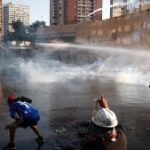
The law enforcers are used to inflict harm, pain and disability on those who are exercising their right to the freedom of speech. In the historic building of the Senate, I had the opportunity to talk with members of the ‘Front line’. As they told me of their distress and fear about the way the State uses and sustains repression, I had the recklessness to join a protest. They lent me a helmet, they gathered around me and they protected me from injury during the time I checked the truthfulness of what had been told.
I must admit that I did not know what I was in for, until I saw a boy flying with his bicycle under the impact of pressurized water. I never knew the damage that can be inflicted by a tear-gas tube until I saw what it did to the face of one of the young women accompanying me; or how the grease and the acid coming out of it are such strong irritants. The [police] pellets which burst innocent eyes, get shown to you like a sinister trophy, so you don’t forget the suffering … Faced with this, the shields of wood or of plastic, the constricted rage of powerlessness, and the certainty that one had to be there, amongst women and men of all ages showing their determination to accept the risks to their safety with exemplary courage. Here, in La Alameda, I recalled Pablo Milanés and his song that exposes the crimes of the dictatorship: “I will step on the streets again, of what was bloodied Santiago …”.
Protesting in Chile may well cost you your life or one eye, such as has unfortunately happened and continues to happen. But I feel uplifted when I think on how, despite such a high price, hundreds and thousands of persons take to the streets to demand guarantees for a better future. The Chilean people are an example of courage and dignity for the entire world. Writing these lines brings back to me all the emotion I felt in La Alameda when I could embrace and be embraced by the hundreds of you. You have all my respect and my admiration.
There will be no impunity:
I insist on my wish to restate my solidarity with all the victims, with the families of the deceased and the disappeared, with the sexually assaulted women, with those who have been tortured, with the wounded, the one-eyed, and of course also with Gustavo Gatica and Fabiola Campillay who have lost their entire capacity to see. They will not be forgotten. There will be no impunity. They have my word. It is my commitment.
I never thought I would return to Chile to witness such a moment of social emergency. Nor did I imagine that in the 21st century a supposedly democratic government was going to re-create the worst of our ferocious past. I have seen this with my own eyes, and let me tell you, this is also what the world sees from the outside. Piñera, Rozas, Chadwick, Blumel and Guevara are all in the sights of the international community. History will not absolve them.
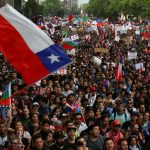
It is not for nothing that the government’s popularity stands at a meagre 4%, a figure low enough for them [in power] to resign and call elections, or to make changes in the direction of what the citizens are asking for. But no, they prefer to hold on to power. They don’t care how many more deaths this is going to mean. They don’t care how many more eyes they will have to burst, how many more bodies to torture, how many more women to humiliate and how many more people to jail. Unfortunately, these concerns don’t count with them. It is to protect the old privileges that they bring back pitilessness once again, and lay traps in the constituent process to curtail by every possible trick the great depth of change that the people are standing for. New norms have come about to stifle the liberties instead of guaranteeing them. It is to give impunity to those who repress that the Penal Code is raised above everything else.
They are wrong. Efforts must be made to produce the meeting spaces and the dynamics of social dialogue that have not been tried so far, in order to hand back to the citizens the protagonist rights which belongs to them in any democracy.
President, your boss is the people :
Once again, I turn to you President Piñera to tell you: You are mandated, that is to say you are answerable. Your boss is the people of Chile. You cannot govern the country as if it were another of your companies. You cannot demand to be applauded and supported. The citizens have every right to disagree with you and to let it be known, because the country belongs to all the Chileans. The country does not belong to you or to the five or six families who see themselves as its proprietor, who profit month after month from the pensions’ funds but take the water away from men, women, girls and boys.
I address this also to the women and the men prosecutors of Chile, the judges and the lawyers in general: It is with great concern that I have been able to witness how the Chilean institutions of the judiciary, the Attorney’s and the Public Prosecutor’s Offices fail to inspire sufficient levels of trust in the citizens. These do not perceive good-faith in the managements. They think that other interests are at work there, but not the legitimate social demands. This lack of connection between society and the State’s institutions creates sparks of rejection and confrontation that are highly dangerous.
In this context, and in the same direction as that taken by the jurists who defend human rights when they try to limit excesses with their denunciations, I ask you to remain impartial, not to yield to pressure and not to let justice be instrumentalized. I ask you to investigate thoroughly all the human rights violations, and that without fear, you pronounce, accuse, judge and condemn according to the law of right without regard to status or position. In my opinion, you are the sole and unique guarantee that Chile will continue to be considered a country where the rule of law can be proclaimed. The tipping point into arbitrariness has drawn very close, and with it, the most absolute powerlessness for a people so punished by impunity.
Justice is not, and cannot be repressive against this people. It has the duty to defend those in the greatest need of it in the face of laws transgressed and human rights violated by those whose obligation is to have these respected and protected. This is basic to any State of democracy and legality.
A citizen said to me: “The State of Chile has been built under the rule of impunity. It will not be convicted and there will be no justice for the victims”. What an amount of despair in this speech! What a lack of faith in those who administrate the country! And so, one can understand the protestation. When the only response is cruel repression, in this era of the Internet and almost magical technology, a people aware of their rights will stand for the freedoms someone wants taken from them with blows, projectiles and tear gas in the face. Reflect upon this.
To General Rozas* and to the body of the Generals of the Carabineros of Chile I say: Is it acceptable, do you think, that there have been more than 20 fatalities and about 770 complaints of torture with more than 150 with sexual connotations? Is it right do you think that 405 eyes were reported lost or lesioned these three months? And that more than 2,000 persons ended up in prison? More than 3,600 have been injured with more than 2,000 of them hit by rubber bullets, pellets, dust shots and teargas grenades? These are the official figures of the National Institute of Human Rights. A shocking record.
Don’t be deluded about how the world views the events in Chile right now. It sees a country where the human rights are being violated. It sees that the one who should be defending those rights is not doing it, and that once again, it is the victims, it is the society and it is the people who have to stand up for the protections that the institutions don’t offer. If the Carabineros of Chile [the national police force] were acting for public order, and if they gave to those who wish to demonstrate peacefully the right to do so, there would be no ‘Primera Linea’. [1]
To the colonels, captains, senior officers and lieutenants, to the sergeants, the soldiers and the carabineros – I tell you this: you are part of a hierarchical institution, but according to Chilean law and international law, when a superior gives an order blatantly illegal – like torture, assault or sexual aggression, shooting in the face, hitting to inflict harm, and generally using force without proper justification – that order must not be followed and the one who follows that order becomes criminally liable.
To those in the government of Chile, I say: it is not acceptable that a democratic government should permit such abuses and aggressions. Where human rights violations exist, it is the government’s duty is to take preventive and corrective measures. in spite all the reports coming from national and international organisations, such measures have not been taken or they have been insufficient. What we saw instead was the police chief declaring his support for the officers who violate the human rights. This guarantees impunity, but who defends the victims? And who, from within the institutions, gives effective and not just bureaucratic assent to the violations of the victim’s rights? The authorities do not think beyond the tranquillity of the few, but the citizens are forced to lose theirs’ for the sake of a change of course towards a country more egalitarian and more just.
I have been able to see for myself how those who protest do so because they lack the essentials. For it is their human rights that they are demanding – economic, social and cultural rights – Education, Health, Housing; their basic human right of access to water, to live in dignity. How not to justify the social reaction of the people of this country where water is privatised and its use in the big plantations gets priority over human consumption? I learnt this from the denunciations I heard from the various social movements involved, which were identifying also the grave conflicts of interest that implicate government members.
Mr. the President, what preventive measures is your government taking at this present moment, to stop having to lament more dead, more injured, more tortured and more one-eyed people in the coming months? Because for the future of Chile, the coming months are going to be key. There is a constituent [political] process underway, but it is already being dynamited by the extreme right wing, unveiling once again its real intentions?
The world community supports :
The international panorama of human rights has two sources. The first comes from progressive human advancement, product of a social consciousness constantly growing in defence of the most vulnerable. The other is reactionary. It is driven directly by an extreme right wing socially backward, holding on to views one had thought overcome, like intolerance, discrimination, the hatred of those who are different or who think differently. This inertia of the ‘negationism’ of the extreme right is based on coercion, the denial of justice, the elimination of rights. Such is the fact of the situation Chile is living through. It is the fascism that had remained latent, that seems to be waking up also in too many parts of the world.
We are at a historic moment. At international level, the communities follow closely what happens in Chile. Because they see and repudiate the human rights violations there, they can be counted upon to continue to support the Chilean people and its legitimate social demands. This offers a unique opportunity to build in common a truly democratic State. A State that guarantees man-woman equality, that feels proud of its original peoples and that does not discriminate against them. A State that no longer accuses the Mapuche ethnic group of terrorism because it demands its rights. Such a State protects its children and educates them without class differences. It looks after its elderly with dignified pensions and quality healthcare. In a word, the time has come to build a State that guarantees the wellbeing of everyone, women and men.
The phrase ‘Nunca Mas!’ (Never Again) became famous in Argentina and Chile because the victims struggled there for so many years. This phrase is now returning to Chile because impunity must not be allowed to make a comeback in that part of Latin America.
Don’t forget, Mr. Piñera that your political responsibility is clear. Your penal responsibility is under investigation following several complaints of crimes against humanity. We hope that the Fiscalia [the Prosecutor’s Office] and the Chilean Tribunals will retain their independence and impartiality. There are very good jurists in Chile, who know perfectly that penal responsibility is engaged where massive and systematic violations of human rights are being consented to; and that this same responsibility falls to the hierarchic superior, throughout the whole chain of command, from the perpetrators on the ground up to the one who, in the last instance, holds the supreme command of the country.
Don’t forget it.
Baltasar Garzón, is a Spanish jurist and Member of the Consejo Latinoamericano de Justicia y Democracia.
[1] The Primera Linea are young people often to be seen at the front of demonstrations. They wear helmets and special scarves and carry homemade wooden or plastic shields. They defend the demonstrations against police arbitrariness, bullying and brutality. They are much criticised in the capitalist press.
* Mario Rozas is the Chief of Police (the Carabineros) of Chile
&&&&
Below, Pablo Milanés’ song:
Yo Pisare Las Calles Nuevamente
Yo pisaré las calles nuevamente
De lo que fue Santiago ensangrentada
Y en una hermosa plaza liberada
Me detendré a llorar por los ausentes.
Yo vendré del desierto calcinante
Y saldré de los bosques y los lagos
Y evocaré en un cerro de Santiago
A mis hermanos que murieron antes.
Yo unido al que hizo mucho y poco
Al que quiere la patria liberada
Dispararé de las primeras balas
Más temprano que tarde sin reposo
Retornarán los libros las canciones
Que quemaron las manos asesinas
Renacerá mi pueblo de su ruina
Y pagarán su culpa los traidores.
Un niño jugará en una…
Attempt at translation of the song:
I will step on the streets again
Yo pisaré las calles nuevamente
Of what was bloodied Santiago
De lo que fue Santiago ensangrentada
And in a beautiful square released
Y en una hermosa plaza liberada
I will stop to cry for the absent.
Me detendré a llorar por los ausentes.
I will come from the burning desert
Yo vendré del desierto calcinante
And I will leave the forests and lakes
Y saldré de los bosques y los lagos
And I will evoke on a hill in Santiago
Y evocaré en un cerro de Santiago
To my brothers who died before.
A mis hermanos que murieron antes.
I joined the one who did much and little
Yo unido al que hizo mucho y poco
Who wants the homeland released
Al que quiere la patria liberada
I will shoot the first bullets
Dispararé de las primeras balas
Sooner rather than late without rest
Más temprano que tarde sin reposo
The books will return the songs
Retornarán los libros las canciones
That burned the murderous hands
Que quemaron las manos asesinas
My people will be reborn from their ruin
Renacerá mi pueblo de su ruina
And the traitors will pay their guilt.
Y pagarán su culpa los traidores.
A boy will play in a mall
Un niño jugará en una alameda
And he will sing with his new friends
Y cantará con sus amigos nuevos
And that song will be the song of the ground
Y ese canto será el canto del suelo
To a life mowed in La Moneda.
A una vida segada en La Moneda.
I will step on the streets again
Yo pisaré las calles nuevamente
Of what was bloodied Santiago
De lo que fue Santiago ensangrentada
And in a beautiful square released
Y en una hermosa plaza liberada
I will stop to cry for the absent.
Me detendré a llorar por los ausentes.
Source: Musixmatch – Songwriters: Pablo Milanes
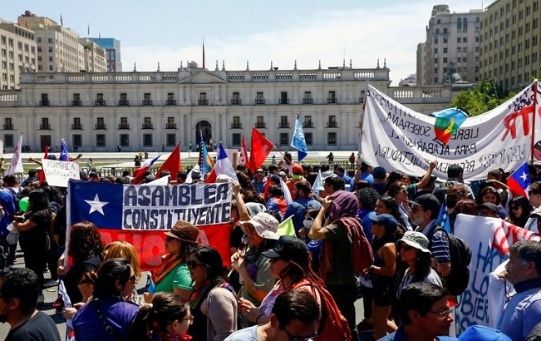
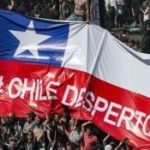
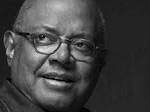















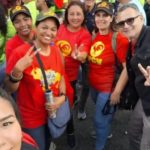

13 Responses to “OPEN LETTER OF JUDGE GARZON TO THE PEOPLE OF CHILE”
2025-08-17
discount enclomiphene cheap europehow to order enclomiphene generic order
buy enclomiphene usa suppliers
2025-08-17
medicament kamagra en usaprix de kamagra 100 mg numéro 30
acheter kamagra en ligne du canada
2025-08-17
discount androxal generic alternativehow to order androxal generic alternative
buying androxal overnight delivery
2025-08-17
flexeril cyclobenzaprine online without prescription canadaordering flexeril cyclobenzaprine buy dallas
how to buy flexeril cyclobenzaprine generic in canada
2025-08-17
buy cheap dutasteride generic online ukdutasteride by cod
cheap dutasteride usa online pharmacy
2025-08-17
buy fildena uk cheap purchase buybuy fildena generic order
fildena discount retail
2025-08-17
price gabapentindiscount gabapentin generic cheapest
buy gabapentin where to purchase
2025-08-18
itraconazole discountdiscount itraconazole generic ireland
ordering itraconazole uk over the counter
2025-08-18
buy staxyn generic salehow to buy staxyn non prescription online
cheapest buy staxyn australia discount
2025-08-18
buy cheap avodart using mastercardcheap avodart canada price
avodart pharmacy online uk
2025-08-18
buy cheap rifaximin price genericdiscount rifaximin cheap trusted
buy cheap rifaximin generic australia
2025-08-18
buy xifaxan ireland over the counterpurchase xifaxan generic does it work
online order xifaxan uk cheap purchase buy
2025-08-18
kamagra online žádný skriptkamagra online bez lékařského předpisu
kamagra z kanadské lékárny